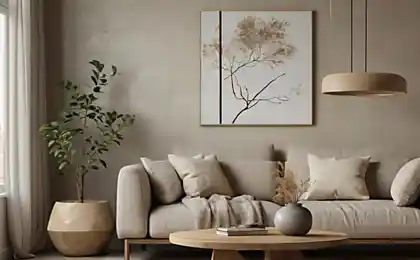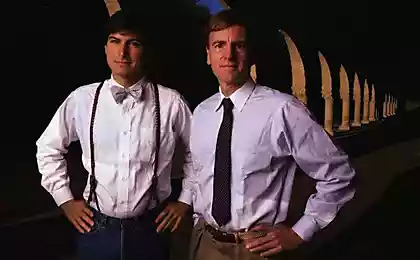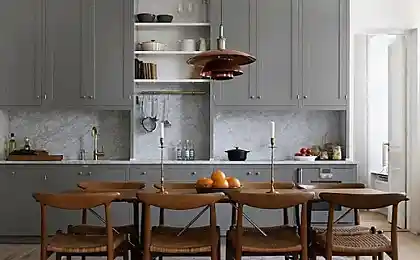536
Anything extra: how minimalism helps to regain control over their own lives
Forty eight million five hundred ninety eight thousand sixty nine
© Damien Hirst
Minimalists Joshua fields Millburn and Ryan Nicodemus from Dayton, Ohio, former employees of a large Corporation and best friends. Just a few years ago in his thirties they received on a monthly basis on the Bank card six figures and were owners of houses with number of rooms exceeding the number of residents, luxury cars and fashion gadgets, — in short, embodied the "American dream". However, joy is not felt.
"The truth was that we were not successful — say, Joshua and Ryan. — perhaps we were just flaunting their status symbols like trophies on a shelf, but we were not successful in fact. At some point we realized that working 70-80 hours a week and buying more things to fill the void. They only brought us more debt, anxiety, fear, stress, loneliness, guilt, turmoil, paranoia and depression. It was a solipsistic experience. And what's worse, we realized that we have no control over the time, as well as no control over your own life."
Having come to this conclusion, Joshua and Ryan decided to find a way to live simply. Several months, Internet searches, enabled them eventually to find a group of like-minded people. Acquainted with them, friends began to practice "permanent reduction": the process by which repression is exposed to all property not recognized you need: clothes, electronics, links, and programs on the computer, the images in the folders. Minimalists say "permanent reduction" is a habit all the time to ask yourself the question: "What is important?". If the second bowl is not used and it doesn't matter, why would she want to own?
Friends also reduced the time watching TV and number of TVs in their homes. Because, in their opinion, television is more often causes us to waste our most valuable resource — time. Care is also affected, we longer and worse tasks. However, fields and Nicodemus saying to abandon the TV completely not necessarily: you just need to be selective in his viewing. You can watch shows and movies together with friends or even away from them, disable unnecessary channels, to get rid of DVD and video game to remove the TV from the bedroom.
To make your life easier, Joshua and Ryan began to "live enough", avoiding too costly, in terms of money, time and effort of fun, if it was not very desirable. In addition, based on their experience, they published several books and developed a program called "21 days", which allows you to form the habit of minimalism and completely reorganize your life in three weeks. It includes, for example, "Party fees" when using friends need to pack all their belongings except those that you will need, as if you were going to move to another house. There is also a "minimalist Machine", in which all lying in the car thing need to look and wonder why they are there, and the item "Health minimalist: diet and exercise".
"Happiness, it seems, is achieved in trying to live a life of meaning, passion, and freedom — say, Joshua and Ryan. — A life that allows us to grow as individuals and to invest power in something outside yourself. It is the growth and attachment forces of the cornerstones of happiness. Not a thing. These resources may not look sexy or marketable, but this is the naked truth. No growth and intentional desire to help others, we are simply slaves to cultural expectations, driven into the trap of power, money, status and illusory success. Minimalism helps people to learn to ask ourselves: "What value things give my life?". After solving the junk, you can clear the space for the most important: health, relationships, passion, growth, and attachment strength. Everyone deserves to be happy. And everyone deserves that his life was meaningful".
"We were not born to live the life of other people. There is no point in wasting your time and energy on envy", Another American minimalist, Joshua Becker lives with his wife and two children in the small city of Peoria, Arizona. Becker says that the desire to change their way of life came to him when he was sorting out the garage. Becker spoke to the neighbor, and that during the conversation dropped, "Maybe you don't have to own all this stuff". Joshua turned to look at his yard. "The effect of the Association was striking, he says. — My possessions were piled up in the driveway. My five year old son played alone in the backyard. My day has eluded me. I immediately realized that I needed to change something. Things did not add value to my life. On the contrary, they deprived her of that."
The family began to donate, give away for recycling and throw away unnecessary things. As a result, according to Becker, they got more money, time, energy, freedom and opportunity to develop something that fascinated them: loyalty, family and friendship. In order to help other people achieve the same thing, Joshua has a blog. Among his developments there, in particular, a list of 10 actions that will make life easier.
This includes not only the decline in property, but also cuts the number of commitments, objectives, negative thoughts, debts, words, and artificial food ingredients in the diet (saturated fat, peeled grain products, corn syrup and sodium). Excessive social contacts (e.g., conversations in social networks), watching TV and video games is also to be reduced. And the habit to work in multitasking Becker advises to opt out, because, in his words, it reduces the productivity.
Also Joshua Becker along with his family has released several books: "Simplify: 7 principles that will help to clean the house and life of unnecessary things", "How to get rid of unnecessary things, if you have children", "All about simplicity" and the book for students to "Live with less".
However, the main Board Joshua there is a call not to compare yourself with others. "For people with the desire to compare is natural, writes Becker. But usually it brings nothing good. So let's stop doing it. We were not born to live the life of other people. There is no point in wasting your time and energy on envy. Instead, you can start to live your own life and decide that today's the day for that. In the end, we all only have one chance".published
Source: /users/1077
© Damien Hirst
Minimalists Joshua fields Millburn and Ryan Nicodemus from Dayton, Ohio, former employees of a large Corporation and best friends. Just a few years ago in his thirties they received on a monthly basis on the Bank card six figures and were owners of houses with number of rooms exceeding the number of residents, luxury cars and fashion gadgets, — in short, embodied the "American dream". However, joy is not felt.
"The truth was that we were not successful — say, Joshua and Ryan. — perhaps we were just flaunting their status symbols like trophies on a shelf, but we were not successful in fact. At some point we realized that working 70-80 hours a week and buying more things to fill the void. They only brought us more debt, anxiety, fear, stress, loneliness, guilt, turmoil, paranoia and depression. It was a solipsistic experience. And what's worse, we realized that we have no control over the time, as well as no control over your own life."
Having come to this conclusion, Joshua and Ryan decided to find a way to live simply. Several months, Internet searches, enabled them eventually to find a group of like-minded people. Acquainted with them, friends began to practice "permanent reduction": the process by which repression is exposed to all property not recognized you need: clothes, electronics, links, and programs on the computer, the images in the folders. Minimalists say "permanent reduction" is a habit all the time to ask yourself the question: "What is important?". If the second bowl is not used and it doesn't matter, why would she want to own?
Friends also reduced the time watching TV and number of TVs in their homes. Because, in their opinion, television is more often causes us to waste our most valuable resource — time. Care is also affected, we longer and worse tasks. However, fields and Nicodemus saying to abandon the TV completely not necessarily: you just need to be selective in his viewing. You can watch shows and movies together with friends or even away from them, disable unnecessary channels, to get rid of DVD and video game to remove the TV from the bedroom.
To make your life easier, Joshua and Ryan began to "live enough", avoiding too costly, in terms of money, time and effort of fun, if it was not very desirable. In addition, based on their experience, they published several books and developed a program called "21 days", which allows you to form the habit of minimalism and completely reorganize your life in three weeks. It includes, for example, "Party fees" when using friends need to pack all their belongings except those that you will need, as if you were going to move to another house. There is also a "minimalist Machine", in which all lying in the car thing need to look and wonder why they are there, and the item "Health minimalist: diet and exercise".
"Happiness, it seems, is achieved in trying to live a life of meaning, passion, and freedom — say, Joshua and Ryan. — A life that allows us to grow as individuals and to invest power in something outside yourself. It is the growth and attachment forces of the cornerstones of happiness. Not a thing. These resources may not look sexy or marketable, but this is the naked truth. No growth and intentional desire to help others, we are simply slaves to cultural expectations, driven into the trap of power, money, status and illusory success. Minimalism helps people to learn to ask ourselves: "What value things give my life?". After solving the junk, you can clear the space for the most important: health, relationships, passion, growth, and attachment strength. Everyone deserves to be happy. And everyone deserves that his life was meaningful".
"We were not born to live the life of other people. There is no point in wasting your time and energy on envy", Another American minimalist, Joshua Becker lives with his wife and two children in the small city of Peoria, Arizona. Becker says that the desire to change their way of life came to him when he was sorting out the garage. Becker spoke to the neighbor, and that during the conversation dropped, "Maybe you don't have to own all this stuff". Joshua turned to look at his yard. "The effect of the Association was striking, he says. — My possessions were piled up in the driveway. My five year old son played alone in the backyard. My day has eluded me. I immediately realized that I needed to change something. Things did not add value to my life. On the contrary, they deprived her of that."
The family began to donate, give away for recycling and throw away unnecessary things. As a result, according to Becker, they got more money, time, energy, freedom and opportunity to develop something that fascinated them: loyalty, family and friendship. In order to help other people achieve the same thing, Joshua has a blog. Among his developments there, in particular, a list of 10 actions that will make life easier.
This includes not only the decline in property, but also cuts the number of commitments, objectives, negative thoughts, debts, words, and artificial food ingredients in the diet (saturated fat, peeled grain products, corn syrup and sodium). Excessive social contacts (e.g., conversations in social networks), watching TV and video games is also to be reduced. And the habit to work in multitasking Becker advises to opt out, because, in his words, it reduces the productivity.
Also Joshua Becker along with his family has released several books: "Simplify: 7 principles that will help to clean the house and life of unnecessary things", "How to get rid of unnecessary things, if you have children", "All about simplicity" and the book for students to "Live with less".
However, the main Board Joshua there is a call not to compare yourself with others. "For people with the desire to compare is natural, writes Becker. But usually it brings nothing good. So let's stop doing it. We were not born to live the life of other people. There is no point in wasting your time and energy on envy. Instead, you can start to live your own life and decide that today's the day for that. In the end, we all only have one chance".published
Source: /users/1077























